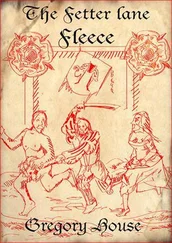And so, while the Polks watched the news in stunned silence, Cathy sat across the room staring past the TV-her mind secretly scrolling with passages from Slumbering in the Stone. She had not told Janet about the inscription at the base of the statue or about the possible connection between this nightmare and her book-a book that she had written not only as a testament to Michelangelo’s genius, but also as a critique of a celebrity obsessed culture asleep on a featherbed of mediocrity. Had her experience with the sculpture down at Watch Hill been a mirror of that very dynamic? Had she been so taken, so fascinated with Tommy Campbell-the football player, the celebrity she had once made time for on Sundays-that she did not even think about little Michael Wenick, the little boy whose disappearance got nowhere nearly as much attention as Campbell’s, and who ultimately, literally ended up taking a backseat to him-both in the minds of Rhode Islanders and the tableau of death in which he played a supporting role?
In essence, Cathy thought, is this psycho, the sculptor of this Bacchus trying to say the same thing I was? Is he holding up Michelangelo’s genius as the standard by which everything else should be judged? Is he, too, saying, “Shame on you world!” for accepting, for worshipping anything less?
Worship, Cathy said to herself, turning the word over and over again in her mind. They once worshipped Bacchus, god of wine, of celebration and theatre, of sexual excess; and now they worship Tommy Campbell, god of a meaningless game, of empty celebrity hookups and breakups, and now the worst of all media excesses.
Perhaps, answered another voice in Cathy’s head-a voice that sounded a lot like Sam Markham’s. But perhaps you’re looking too deeply in the wrong direction. Perhaps the killer not only chose his victims because they looked like the figures in Michelangelo’s original, but also because only the death of a public persona like Campbell’s, or the incomprehensible death of a child, could draw the kind of media attention you’re witnessing now. Maybe it takes that much nowadays to get through to us. Maybe the killer is trying to show us not only where our values are, but also, by virtue of his actions, how much it will take to wake us up.
Wake us up. Yes. Wake us up in some sick way to remind us of our own potential.
What do you mean? asked Sam Markham in her mind.
The deeper message in Slumbering in the Stone-the quote by Michelangelo upon which the title of the book is based.
Of course. The quote.
“The quotes,” Cathy said out loud.
“What’d you say, Hildy?”
“Excuse me, Jan. Is it okay if I use my cell phone in the kitchen?”
“Is everything all right, dear? Do you want us to turn off the television?”
“No, no, please,” Cathy said. Had she known that the FBI agent had already finished reading her book in his hotel room, that he, too, had drawn his own conclusions about the killer’s motives, Cathy might have had second thoughts about calling him. “I just remembered something I forgot to tell the FBI. But I’d like a little privacy. Is that okay, guys?”
“Of course,” said Dan Polk. “And while you’re in there, call the escort service for me. Tell ’em to send over Helga. Tall, blond, and a little Hulk Hoganesque is what I’m craving this evening.”
Janet elbowed him and Cathy disappeared into the kitchen-found her purse on the table and retrieved the FBI agent’s card. Samuel P. Markham , it read beneath the official seal. Supervisory Special Agent, Behavioral Analysis Unit-2.
“ Markham,” Cathy said to herself à la James Bond. “Samuel P. Markham. The ‘P.’ stands for ‘Pretty Damn Cool.’ ” Cathy smiled-felt the blood go warm in her cheeks-and dialed the number.
“Hello?” said the voice on the other end.
“Hello, Sam?”
“Yes.”
“It’s Cathy. Cathy Hildebrant.”
“Hi, Cathy. I was going to call you to see how you were doing, but I didn’t want to bother you. You’ve had quite a day. The reporters have left you alone, I take it?”
The FBI agent sounded different, Cathy thought-his voice tired and tight.
“Yes,” Cathy said. “I’m spending the night in Cranston with Janet Polk and her husband.” Markham did not say anything, and Cathy had the sneaking suspicion he already knew. “Anyway, we were watching TV and I saw they released the identity of that boy-the one who was murdered along with Tommy Campbell. Michael Wenick is his name.”
“Yes. We suspected it was him from the beginning, but couldn’t alert the public until we got confirmation from the medical examiner and the boy’s mother. It all came together shortly after I dropped you off.”
“He was a local, Sam-grew up in the same neighborhood as I did. And I feel awful for not recognizing him when we were down there at Watch Hill. It’s why I’m calling you.”
“What’s up?”
“I just remembered that, when we were talking about the anonymous quotes in connection to my book, well, I forgot to mention that the title of the book itself, Slumbering in the Stone , was also taken from a quote by Michelangelo.”
“‘The best artist has that thought alone which is contained within the marble shell,’” Markham said. “‘Only the sculptor’s hand can break the spell to free the figures slumbering in the stone.’”
“Yes, that’s it,” said Cathy, flustered.
“I have your book right here in front of me. Just finished skimming through it about a half an hour ago. Interesting stuff.”
“Thank you,” Cathy said, suddenly nervous. “Well, you see, Sam, upon its initial publication, Slumbering in the Stone was met with quite a bit of controversy in academic circles-beginning with my interpretation of that quote. What I mean is, the traditional translation of Michelangelo’s Italian held that the word ‘only’ in the last half of the quote came after the word ‘can.’ Thus, for years the statement was thought to have read, ‘The sculptor’s hand can only break the spell to free the figures slumbering in the stone.’ I won’t bore you with the details, but through my research I discovered that the word ‘only’ should actually come at the beginning of the sentence. Therefore, the quote should really read, ‘ Only the sculptor’s hand can break the spell to free the figures slumbering in the stone.’ You see how it changes the meaning?”
“Yes,” said Markham -distantly, studying the quote. “It changes the emphasis entirely. The sculptor himself becomes of supreme importance, making him much more special -that he and only he has the power to release, to awaken the figures from their sleep inside the marble.”
“Exactly. Of course, Michelangelo is speaking metaphorically of the potential in a block of marble to become something beautiful, as well as the fact that only through the lens of true genius can this potential be seen. But the artist is also speaking of the magical, nothing short of divine connection that he felt between himself and his creations, for it was from God that Michelangelo received not only his talent and inspiration, but also his torment.”
“Go on.”
“The classical tradition in which Michelangelo’s artistry is steeped-that is, the humanistic tradition hearkening back to the ancient Greeks-held that the male body was aesthetically superior to the female. It is a well-known fact that homosexuality was an integral part of ancient Greek culture, but not in the way we think of homosexuality today-or during Michelangelo’s time, for that matter. And remember, of course, that we are just talking about men here, for women in ancient Greece were viewed as little better than livestock. You see, although pretty much any type of sexual exploit was open to the male, exclusive homosexuality was actually frowned upon in ancient Greece. And they most certainly didn’t define a man by his sexual orientation the way we do today. In fact, sexual relations between men-usually between an older man and an adolescent boy between the ages of thirteen and nineteen-were not necessarily seen as a sexual act at all, but as an educational rite of passage into manhood. It was through the exploration of the male body that Greek men could experience the highest form of divinely inspired beauty-a realm, if you will, in which they could walk in the light of the gods. Sometimes the relationship between two males evolved into the deep, spiritual connection of love, and it is for this reason we see in Greek mythology love between two males much more highly prized than love between a man and a woman.
Читать дальше












